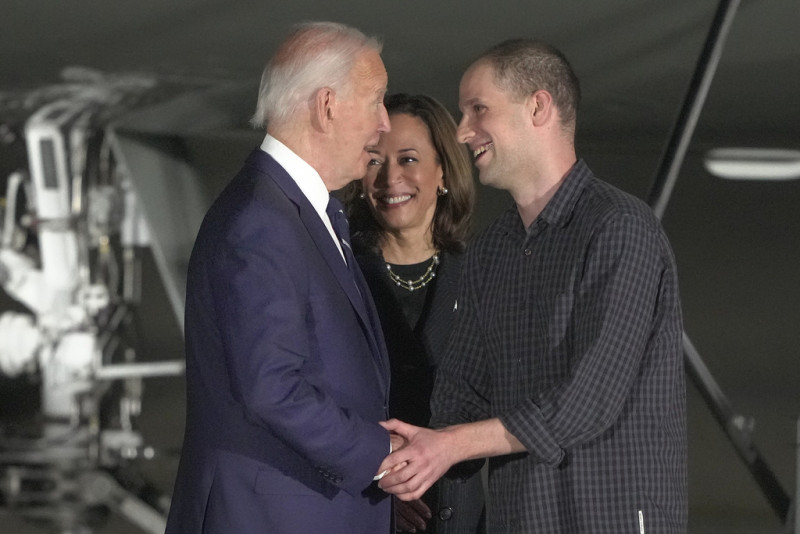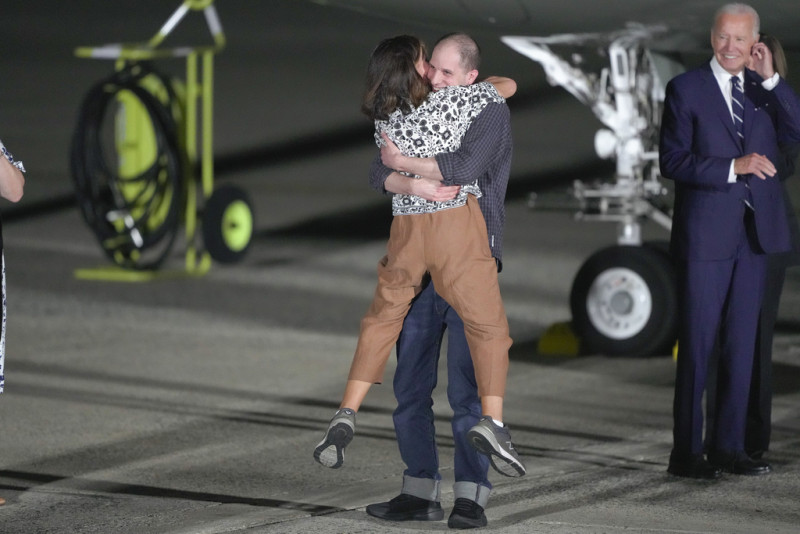Among them are Wall Street Journal reporters Evan Gershkowitz and RFE/RL’s Also Kurmaseva, as well as ex-Marine Paul Whelan – The Biden and Harris reception
“It is a matter that is best resolved in silence.”
That’s the line from Russian officials when asked to comment on possible East-West prisoner exchanges. Words that have been heard for months, as reported by BBC News.
This is how the Kremlin likes it: behind closed doors, “hostage diplomacy” away from the media spotlight. Intelligence talks to intelligence. Government to government. Until Moscow gets whatever – or rather whoever – it wants. But despite the “silence” there were signs. That something was moving.
In an interview with former Fox News anchor Tucker Carlson last February, Vladimir Putin spoke about Evan Gershkovich, the Wall Street Journal reporter who was arrested in Russia and charged with espionage.
“I do not rule out that Mr. Gershkovich can return to his homeland,” Putin said. “We want US special services to think about how they can contribute to the goals that our special services are pursuing.”
It was a public and subtle hint: Moscow was open to making a deal.
The Kremlin leader did not name. But he made it pretty clear who Russia wanted in return: Vadim Krasikov, the suspected Russian agent serving a life sentence for murder—not in America, but in Germany.
A few days later, Russian opposition leader Alexei Navalny died in a remote Arctic penal colony. Rumors circulated that before his death, talks had begun to exchange Mr Navalny, Evan Gershkovic and former US Marine Paul Whelan, all imprisoned in Russia, for Vadim Krasikov in Germany.
Had the German authorities begun negotiations for a prisoner exchange?
The behind-closed-doors trial of Evan Gershkovich – described as a “muff” by the Wall Street Journal and the US government – finally began in Yekaterinburg. The case was adjourned until mid-August.
However, last month, the court unexpectedly held a second hearing. At the end of a lightning three-day trial, Evan Gershkovich was sentenced to 16 years in a penal colony.
On the same day, American-Russian journalist Alsu Kurmasheva was sentenced to 6.5 years in prison by a court in Kazan. Her trial lasted just two days.
Someone was obviously in a hurry. It was the strongest sign yet that a deal had been made, that a trade was likely. Russian authorities usually treat conviction as a condition for any prisoner exchange.
Earlier this week – there were more signs. Reports that a number of prominent Russian political prisoners had been moved from penal colonies or detention centers.
Speculation grew. Could these dissidents be part of a larger prisoner swap than first thought?
Meanwhile in Belarus, the country’s leader, Alexander Lukashenko, agreed to pardon Rico Krieger, a German citizen sentenced to death on terrorism and other charges. Could it be part of an exchange?
Now we know. This is the largest East-West prisoner exchange since the Cold War.
Western governments welcome the release of prisoners, as well as the freedom of some of Russia’s most prominent political prisoners.
Moscow celebrates the return of its agents. Both sides claim this is a good deal.
But if Russia finds, as it has in the past, that “hostage diplomacy” works, then it is worrying as this may not be the last time that prisoners – both foreign and Russian – are used as bargaining chips.
A total of 16 prisoners were released from Russian prisons, including Wall Street Journal reporter Evan Gershkowitz and former US Marine Paul Whelan who were accused of espionage, as well as Russian dissidents. For its part, the US and its allies released 10 prisoners – among them Russian intelligence officers, who returned to Russia. The US president called the exchange a “diplomatic feat”, confirming that three Americans were among the 16 people freed by Russia, including five Germans and seven Russians.
With information from BBC News
Source :Skai
With a wealth of experience honed over 4+ years in journalism, I bring a seasoned voice to the world of news. Currently, I work as a freelance writer and editor, always seeking new opportunities to tell compelling stories in the field of world news.













